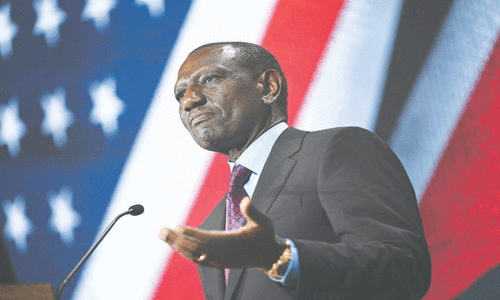Haiku, a poem typically consisting of 17 syllables in three lines of five, seven and five syllables, has spread beyond the boundaries of its country of origin. Lovers of this form of poetry have now launched a campaign aiming to help get this Japanese tradition added to Unesco’s Intangible Cultural Heritage list.
The movement indicates how much haiku is loved both at home and abroad regardless of the language. English compositions of haiku date back to the Meiji era (1868-1912), when British scholars and diplomats introduced the form overseas. Haiku became known abroad particularly after the end of World War II, thanks to books by people such as Japanese culture expert R.H. Blyth (1898-1964).
The Arakawa Ward Office in Tokyo held its first workshop on haiku in English for junior high school students in November last year. The programme’s purpose was to encourage them to enjoy learning the language while also becoming interested in this poetic form that originated in Japan. Eight children tried their hand at composing their own poems, referring to a handbook.
The poem that won the top prize went as follows:
Snowdays / warm kotatsu / many dreams
The poem, which describes a typical snowy day scene of using a kotatsu table with a heater underneath and a quilt over top, was featured in the January issue of the ward office’s newsletter.
“The students seemed to find [composing haiku in English] easy as they can be made just by arranging words,” said Yasuko Tsushima, a haiku poet who instructed the children. “They all enjoyed the workshop.”
When Ito En Ltd. launched a haiku contest in 1989, the manufacturer of green tea products was surprised to receive many submissions composed in English, even though the competition had no category for such works at the time. That prompted the Ito En Oi Ocha New Haiku Contest to set up an English category the following year, which attracted 673 entries.
In the 28th year of the prize this year, the results of which were announced last month, the English haiku category received 18,248 entries — the highest ever — and the top spot went to Gracie Starkey of England, who was 13 at the time of her submission. Starkey became the first non-Japanese to win this category.
Last year’s top prize-winner was also a teenager, a Japanese high school student.
“We receive an increasing number of submissions from junior high and high school students who have studied [haiku] at school,” said Adrian Pinnington, a British professor at Waseda University who also serves as a judge for the annual contest. “[The Japanese] have a culture that appreciates daily life, and many students have a sense for haiku.”
Entries for the Ito En Oi Ocha New Haiku Contest come not only from English-speaking countries, but also from Europe, South America, Africa and other regions. “Non-native speakers of English learn haiku through English translations, and some of them can create splendid poems as they build up their skills through group learning,” he said.
As an example, the professor referred to one of the winning works in last year’s English haiku category:
Grape harvest / the morning chatter / of starlings The poem, submitted by a Slovenian man, “has splendid wording”, Pinnington said.
Meanwhile, Abigail Friedman, a former US diplomat who is now the founder and chief executive officer of a consulting business, is herself a haiku poet. She uses the pen name “Fuji” and has been studying since 2001 under Momoko Kuroda, who presides over the haiku magazine Aoi.
Since returning to her home country in 2003, Friedman has established haiku groups in the United States and Canada while composing poems in Japanese, English and French. She won the grand prize in a newspaper contest with a haiku written in English.
“Haiku is a form of traditional art for Japanese, but we can compose them without being bound by traditions,” Friedman said, adding she believes Japanese people can create “much more interesting haiku” if they study poems composed overseas in different cultures.
In January, four domestic haiku organisations held a joint press conference to announce that a council would be established in April to help the poetic form get registered on Unesco’s Intangible Cultural Heritage list.
“Haiku is so short, but thanks to this feature, interest in it has been spreading worldwide, even among those who have never tried creating poems,” Akito Arima, president of the Haiku International Association, said during the press conference.
To help haiku gain Unesco status, Arima, a former education minister, added that the campaign will also eye any short poems composed overseas under the banner of haiku.
Known as a haiku poet himself, former European Council President Herman Van Rompuy expressed his utmost support for the goal.
“Belgian beer is now on the [intangible cultural heritage] list. I think there are strong arguments for haiku,” the Belgian politician said humorously when he delivered a speech at a banquet during a visit to Japan in January.
Asked by The Yomiuri Shimbun following the dinner about the project’s feasibility, Van Rompuy said it would take time but what will matter is how passionate they are and how long they can be patient until haiku is finally given the nod of Unesco status.
The Japan News
Published in Dawn, August 9th, 2017















































Dear visitor, the comments section is undergoing an overhaul and will return soon.